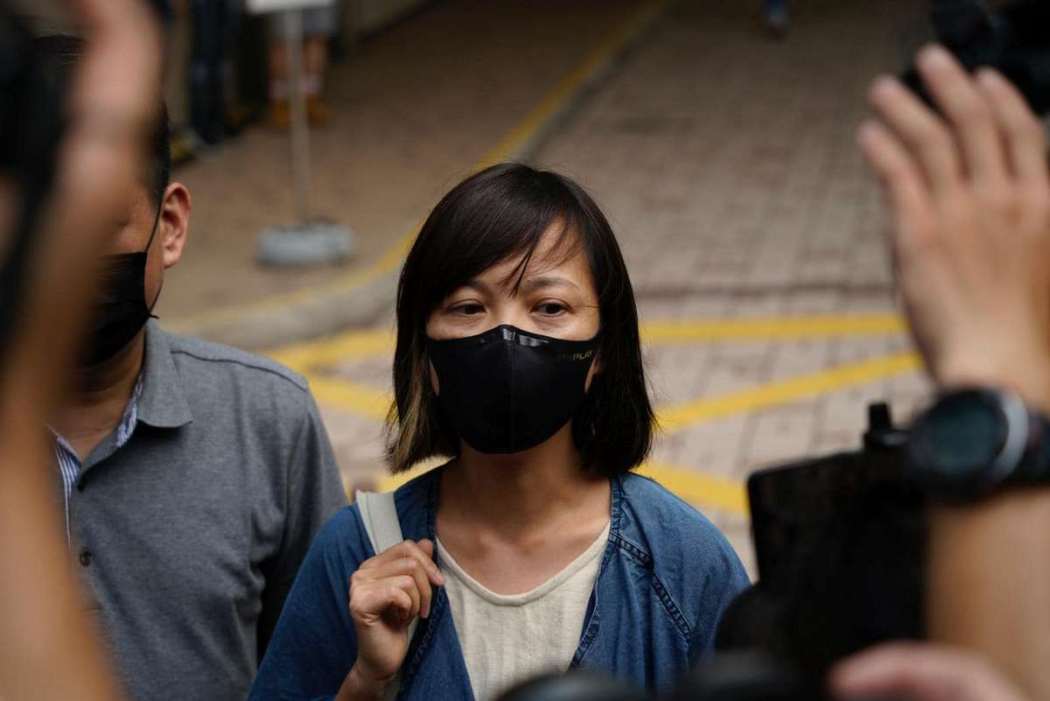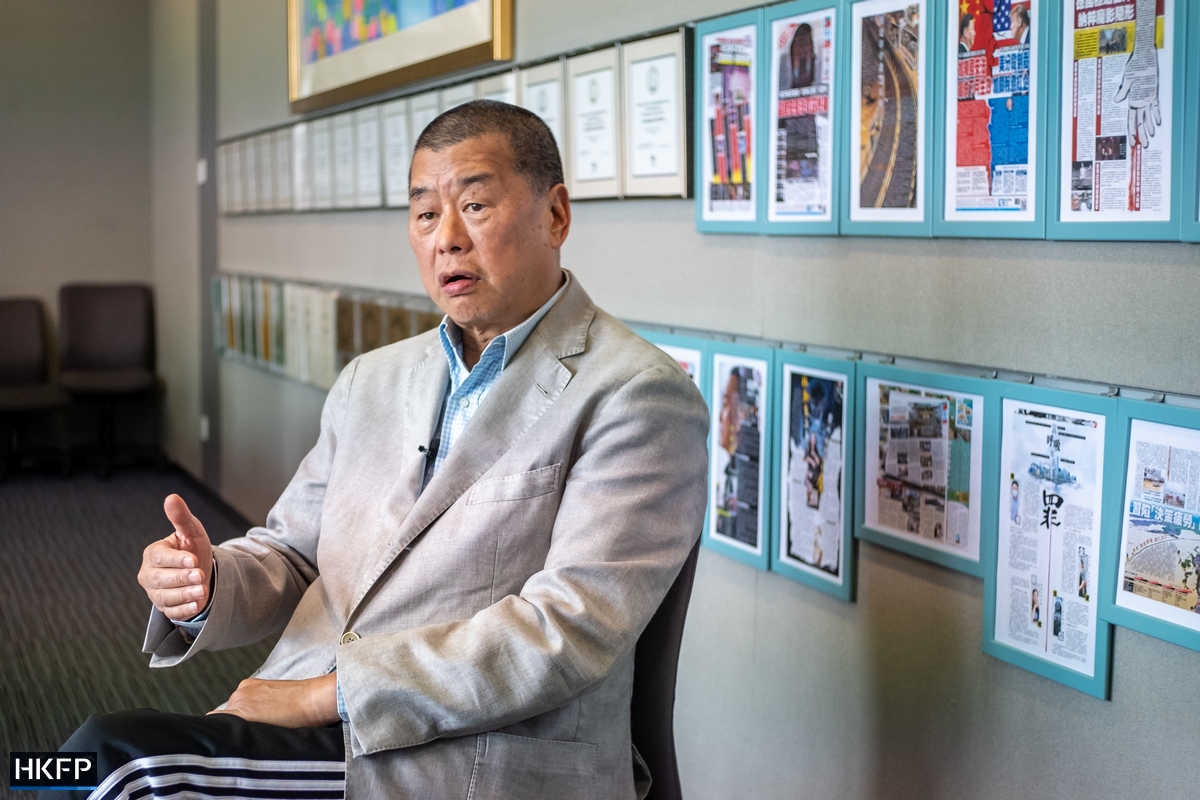Apple Daily began publishing English content because founder Jimmy Lai thought US politicians would offer the pro-democracy paper support if they were readers, a former publisher at the tabloid has told the national security trial against the media tycoon.
Former associate publisher Chan Pui-man told a panel of three handpicked judges that Lai was of the view that the now-shuttered paper could garner support from the “international community,” which would – in turn – exert pressure on the Hong Kong authorities.

Chan is among six senior Apple Daily employees who have pleaded guilty to conspiring to collude with foreign forces in November 2022 and will be sentenced after Lai’s trial, which is expected to last 80 days.
Lai is being tried before three judges chosen by the government to oversee national security cases, with no jury – a departure from the city’s common law system.
Prosecutor Ivan Cheung on Tuesday presented text messages sent after May 10, 2020, concerning the media outlet’s addition of English content on its website.
Cheung presented a text message from Lai in a WhatsApp group opened by Lai on May 10, 2020 with the name “English News.” Lai, on the same day, told senior management at the paper that a translation of an article penned by commentator Fung Hei-kin was “worth considering”.
‘International publicity front’
Cheung presented the article titled “The one million people who don’t support Apple Daily”, in which Fung wrote that the paper could “absorb one million potential customers” internationally.

Fung also wrote that the paper would have to participate in the “international publicity front” to “add value” to the paper.
English news was only published in digital form and was largely absent from the physical paper, which was in traditional Chinese, Chan also told the court. That was because the English content was intended for an overseas audience that physical copies would not be able to reach, she added.
Chan confirmed that the purpose of introducing English news content was to participate in the “front” and attract the international community’s attention. She added that Lai was of the view that English content could be a form of “protection” for the newspaper.
Cheung asked: “Protection from what?” Chan then told the court that the international community, including US political leaders, could offer support if Apple Daily was ever “subject to suppression.”

The prosecution presented a text message from Lai asking his assistant Mark Simon to try to get then-US vice president Mike Pence to subscribe to Apple Daily. “The publicity and respect it commands would arouse much support for us,” he said.
Chan told the court that Lai was of the opinion that US society would be able to exert pressure on the Hong Kong authorities, and US politicians would make verbal condemnations against the “suppression” of Apple Daily or even impose sanctions against the Hong Kong government.
Breaking the monopoly
Lai would regularly express his opinions on the English section to ex-publisher Cheung Kim-hung, Chan told the court, adding that the founder had thought that the Alibaba-owned South China Morning Post (SCMP) had a “monopoly” on the local English-language news industry.
The court also presented texts from former digital director Nick Cheung telling Lai and former publisher Cheung that Apple Daily would have to “promote effectively” if they wanted overseas readers to actively subscribe to English content.

The digital director – also in the same message – said that the paper’s “ultimate goal was to fight on the international front,” according to the texts shown in court. Asked whether that was indeed Apple Daily’s objective, Chan said it was the effect that Lai aimed to achieve.
The prosecution presented a text from Lai saying that the paper was not trying to “strike a balance,” but rather, seeking to represent a general view of the “yellow side” — the pro-democracy camp.
“When we choose writers, we don’t have to think about giving foreigners a balanced view of what happens here,” Lai said in his message. “We only concentrate on our Apple Daily HK view, a general view of the yellow side.”
Chan told the court that Lai had told management to focus on the voice of the pro-democracy cause, and confirmed that the “Apple Daily HK view” that Lai referred to was consistent with that of the pro-democracy camp.

Chan, referring to the transcript of a recorded meeting on May 12, told the court that Lai had requested more news about China focusing on rights activists. As for local news, Lai was concerned about police brutality, human rights, and freedom.
Lai thought that, once Apple Daily could set its English coverage apart from SCMP, people would subscribe to the pro-democracy paper.
For Apple Daily’s English content, Lai wanted more reports on US-China relations, whereas an award-winning investigation about industrial safety at the MTR’s Sha Tin to Central Link was sidelined.
“My guess was that the Shatin-Central link was not that kind of news,” Chan said
Responding to a question posed by judge Alex Lee as to why Apple Daily was involved in the “international front” at all, Chan said the paper was supportive and understanding of the situation of the demonstrators in 2019 and 2020.

“Some demands were for universal suffrage, which was in line with Mr Lai’s pro-democracy stance,” Chan told the court.
Protests erupted in June 2019 over a since-axed extradition bill. They escalated into sometimes violent displays of dissent against police behaviour, amid calls for democracy and anger over Beijing’s encroachment. Demonstrators demanded an independent probe into police conduct, amnesty for those arrested and a halt to the characterisation of protests as “riots.”
Apple Daily was one of Hong Kong’s most prominent newspapers and was known for its entertainment coverage as well as its pro-democracy stance.
Lai, who has been detained since December 2020, is one of the most well-known figures to be charged under the national security law, which Beijing imposed in Hong Kong in June 2020 following the previous year’s demonstrations.
Lai’s case is seen globally as a bellwether for the state of press freedom in Hong Kong, although authorities have maintained that the city still enjoys a high degree of media freedoms.
Support HKFP | Policies & Ethics | Error/typo? | Contact Us | Newsletter | Transparency & Annual Report | Apps
Help safeguard press freedom & keep HKFP free for all readers by supporting our team























